Slight Risk For Severe Storms Beginning Sunday Morning
March 15, 2014
Here is your official North Escambia area forecast:
- Tonight A slight chance of showers before 7pm, then showers likely and possibly a thunderstorm between 7pm and 1am, then showers and thunderstorms after 1am. Some of the storms could be severe. Low around 59. Southeast wind 5 to 10 mph. Chance of precipitation is 90%.
- Sunday Showers and thunderstorms before 1pm, then showers likely and possibly a thunderstorm after 1pm. Some of the storms could be severe. High near 75. South wind around 10 mph becoming west in the afternoon. Chance of precipitation is 100%.
- Sunday Night Showers likely. Cloudy, with a low around 55. West wind around 5 mph becoming northeast after midnight. Chance of precipitation is 70%.
- Monday Showers likely. Cloudy, with a high near 67. Northeast wind 5 to 10 mph becoming west in the afternoon. Chance of precipitation is 70%.
- Monday Night Mostly cloudy, with a low around 45. West wind 5 to 10 mph.
- Tuesday Mostly sunny, with a high near 69. Northwest wind 5 to 10 mph becoming southwest in the afternoon.
- Tuesday Night Partly cloudy, with a low around 46. South wind 5 to 10 mph.
- Wednesday Mostly sunny, with a high near 74. West wind 5 to 10 mph.
- Wednesday Night Mostly clear, with a low around 48.
- Thursday Sunny, with a high near 75.
- Thursday Night Mostly clear, with a low around 44.
- Friday Mostly sunny, with a high near 75.
Commissioners Defer Vote On Hiring Administrator
March 15, 2014
The Escambia County Commission has once again delayed the process of choosing a county administrator…voting Friday to put their final decision off for two weeks.
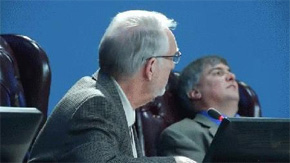 Commissioners interviewed five candidates for about three hours on Thursday before commissioner Wilson Robertson motioned to hire Interim County Administrator Larry Newsom. That failed 2-3 with Commissioner Gene Valentino and Robertson voting yes.
Commissioners interviewed five candidates for about three hours on Thursday before commissioner Wilson Robertson motioned to hire Interim County Administrator Larry Newsom. That failed 2-3 with Commissioner Gene Valentino and Robertson voting yes.
The push to hire Newsom continued during a Friday meeting, with tempers rising. As Valentino pushed for Newsom, he fired off “…will you tell him to shut up”, asking Commission Chairman Luman May to quiet fellow Commissioner Grover Robinson.
Robinson, May and Steven Barry have pushed to hire from the list of five finalists created by a search firm hired by the commission.
The commission on Friday voted to defer a vote on the selection of a new County Administrator until the next regularly scheduled board meeting, which will be held on Thursday, April 3, 5:30 p.m.
Florida Gov’t Weekly Roundup: History Intrudes On Legislative Session
March 15, 2014
Despite all the action underway during the legislative session over the last week, the Capitol seemed like a place stuck in past decades.
The death of former Gov. Reubin Askew, one of the most important figures in Florida history, triggered nostalgia for the days when the teetotaling chief executive worked to safeguard the environment, repair scandal-tarnished courts and open government business to the public.
 Askew’s passed away on the same day that the Florida Supreme Court threw out a medical malpractice law approved by the Legislature 11 years ago — and subject to controversy ever since. Both events came a couple of days after former Chief Financial Officer Alex Sink, who first ran for statewide office in 2006, once again stood before voters, this time in a special congressional election that was instead won by Republican lobbyist David Jolly.
Askew’s passed away on the same day that the Florida Supreme Court threw out a medical malpractice law approved by the Legislature 11 years ago — and subject to controversy ever since. Both events came a couple of days after former Chief Financial Officer Alex Sink, who first ran for statewide office in 2006, once again stood before voters, this time in a special congressional election that was instead won by Republican lobbyist David Jolly.
And while the Legislature spent the week on present and future concerns, GOP lawmakers devoted much of their time to discussing one of the party’s golden oldie issues: Tax cuts.
The legislative session isn’t history yet — not even close — but the week was a reminder that even once it has ended, its effects can be felt for years.
‘ONE OF THE GREAT LEADERS’
With the exception of the late Gov. LeRoy Collins, Askew is seen as perhaps the most influential politician in Florida history.
The prim, almost prudish Democrat was first elected in 1970, defeating incumbent Republican Claude Kirk, the first GOP governor in the modern era.
Askew won again in 1974, becoming the first governor in Florida history to be elected to successive four-year terms. (Many, though not all, earlier governors were barred from running for more than one term, or could only run for two-year terms, depending on the Constitution at the time.)
Florida was in the midst of a population and development boom when Askew took over as chief executive. The state was still grappling with racial tensions prompted by the U.S. Supreme Court decision that put an end to school segregation. The devoutly religious Askew, born in Muskogee, Okla., was on the opposite side of many other Southern politicians, as well as many of his Pensacola constituents, in his call for racial reconciliation.
Askew clashed with conservatives over a “straw poll” opposing school busing, offering his own proposal asking voters if they wanted to keep schools integrated. Neither was binding, and both were approved.
The governor led a drive to reform the state’s judicial system after two state Supreme Court justices were forced out of office. He successfully pushed for a constitutional amendment requiring public officials to disclose information about their financial affairs and forcing government records into “the sunshine.” On the environment, Askew backed legislation creating water management districts and requiring local comprehensive planning.
“He was a visionary. He saw issues, whether they were in areas of racial fairness or educational opportunities or environmental protection, in a generational perspective, not just what’s going to be the best position for the next election. He led by his personal example and by the wisdom of his ideas and the strength of his passions,” said former U.S. Sen. Bob Graham, a Democrat who also served as governor.
Jeb Bush, Florida’s first Republican governor elected to successive four-year terms, also praised Askew in a statement.
“Florida has lost one of the great leaders who played a pivotal role in shaping the trajectory of our state during a time of substantial growth and change,” Bush said. “He led on contentious issues, fought for equality and did what he believed was in the best interests of Florida families. Governor Askew always put principle before politics, and I was fortunate to know him, seek counsel from him and learn from his years of service.”
‘DISAPPOINTING, AS USUAL’ RULING ON MED MAL LAW
After more than a decade of legislative and legal battles, the Florida Supreme Court had the final say on a 2003 law limiting damages in medical-malpractice lawsuits. It was unconstitutional, the justices said in a 5-2 ruling.
The court sided with the family of a Panhandle woman who died of complications after giving birth. In doing so, justices also sided indirectly with plaintiffs’ lawyers who have fiercely opposed limits on so-called “non-economic damages.” Physicians and insurance companies, who have made a priority of reining in medical-malpractice lawsuits, came out the losers.
“At the present time, the cap on non-economic damages serves no purpose other than to arbitrarily punish the most grievously injured or their surviving family members,” Justice R. Fred Lewis wrote.
The two most conservative justices dissented.
“This court has previously recognized the existence of a medical malpractice insurance crisis as a legitimate state interest,” Chief Justice Ricky Polston wrote. “Further, it is undisputed that increasing the quality, availability, and affordability of health care for Floridians is a legitimate state interest. And the Legislature’s policy choice of enacting a cap on non-economic damages in medical malpractice cases is rationally related to these state interests.”
The ruling stemmed from the February 2006 death of 20-year-old Michelle McCall, who gave birth to a son at Fort Walton Beach Medical Center but died days later because of complications from severe bleeding.
Republicans, who have often warred with the trial bar over the years and pushed the caps through the Legislature in 2003, were predictably upset by Thursday’s decision.
“Disappointing, as usual, from them,” Senate Rules Chairman John Thrasher, R-St. Augustine, said when asked about the justices’ ruling. “But we’ll see what we have to do to address it.”
It wasn’t clear whether or how lawmakers would attempt to overturn the court’s decision through legislation during the current session. But no one was ruling it out yet.
JOLLY IS JOLLY AS SINK SINKS
While much of the state’s political and business establishment had been focused on the legislative session underway in Tallahassee, the national media and a handful of big-money groups were zeroing in on another corner of the state: Pinellas County, where Sink was attempting a comeback and Jolly was looking to move from K Street to the U.S. Capitol.
In the end, Jolly won the contentious and expensive special election on Tuesday to replace his former boss, the late Republican Congressman C.W. Bill Young. The swingy district, which Young and President Barack Obama both won in 2008 and 2012, was monitored by strategists and analysts looking for tea leaves about the November elections that will decide who controls Congress during Obama’s last two years in office.
As usual, the winning side portrayed the victory as a signal about what would happen almost eight months from now.
“Tonight, one of Nancy Pelosi’s most prized candidates was ultimately brought down because of her unwavering support for ObamaCare, and that should be a loud warning for other Democrats running coast to coast,” U.S. Rep. Greg Walden, chairman of the National Republican Congressional Committee, said in a press release after the vote.
Also following the script, Democrats tried to play down the idea that the defeat was, in fact, a defeat.
“Tonight, Republicans fell short of their normal margin in this district because the agenda they are offering voters has a singular focus — that a majority of voters oppose — repealing the Affordable Care Act that would return us to the same old broken health care system,” Democratic National Committee Chairwoman Debbie Wasserman Schultz, a congresswoman from Broward County, said in a release.
MO MONEY, MO TAX CUTS
At a Wednesday meeting in an obscure corner of the Knott Building, state economists huddled and predicted that the state would take in about $150 million more over the next 16 months than current estimates called for. It didn’t take long for House Speaker Will Weatherford, R-Wesley Chapel, to decide where the money would go.
“Obviously, a lot of it’s going to be spent on tax cuts,” he told reporters.
Lawmakers had already set a goal of $500 million in reductions in taxes and fees, following a benchmark set by Gov. Rick Scott last year. That overall number isn’t likely to change even with the new revenue figures, but it does give lawmakers more wiggle room.
On Thursday, the Senate Appropriations Committee unanimously amended a proposal (SB 156) by Chairman Joe Negron, R-Stuart, to reduce the vehicle registration fees. Under the revised proposal, motorists would potentially save between $20 and $25 per vehicle registration, depending on the size of the vehicle.
The reduction would collectively save motorists about $309 million during the upcoming 2014-15 budget year, with the new rates going into effect Sept. 1, and about $395 million the following fiscal year, when they would be in effect for the full 12 months starting July 1.
A similar House proposal (PCB 14-04) was unanimously backed Thursday by the House Finance and Tax Subcommittee, even as Democrats complained the reduction was more about getting Scott re-elected than fiscal policy.
“There is a great line in ‘The Wizard of Oz’ that I like. ‘Pay no attention to that man behind the curtain.’ I feel like we need to take the curtain down,” said Rep. Jared Moskowitz, D-Coral Springs.
Other tax bills were also moving. The Senate Commerce and Tourism Committee on Monday unanimously supported a measure (SB 792) by Sen. Anitere Flores, R-Miami, that would lift sales taxes on clothes, school supplies and electronics for three days at the start of August.
And the Senate Communications, Energy and Public Utilities Committee approved a plan by Agriculture Commissioner Adam Putnam (SB 1076) to cut in half the sales tax that businesses pay for electricity and funnel about half of it to an education facilities program.
STORY OF THE WEEK: Former Gov. Reubin Askew, one of the most important figures in state history, died at the age of 85.
QUOTE OF THE WEEK: “I’m waiting on the day when somebody gets indicted on the Thursday before the election, and they get elected because everybody’s already voted and they can’t get their ballot back.”–Sen. Jack Latvala, R-Clearwater, on the dangers of voting by mail.
by Brandon Larrabee, The News Service of Florida
Woman Sentenced On ‘Operation Blister Pack 2′ Charges
March 14, 2014
Another former North Escambia resident has been convicted in connection with last year’s Operation Blister Pack 2.
 Jennifer Dianne Kelly, age 34, was convicted Thursday of conspiracy to traffic in amphetamine or methamphetamine, possession of a listed chemical.
Jennifer Dianne Kelly, age 34, was convicted Thursday of conspiracy to traffic in amphetamine or methamphetamine, possession of a listed chemical.
Under a plea agreement, Kelly was sentenced to 18 months in state prison to be followed by 18 months probation with eight hours of community service per month. She will also be required to receive substance abuse counseling. She also was ordered to pay $54,222 in costs and fines.
Kelly was a resident of Ayer Street in Molino at the time of the operation, according to the Sheriff’s Office. She later moved to Milton, according to jail records.
Operation Blister Pack 2 targeted nearly 80 individuals on methamphetamine and pseudoephedrine related charges. Many of those arrested were involved with drug groups dubbed “The Village Group”, centered around “The Village” area of Forrest Street and Lakeview Avenue in Cantonment; and “The Ayers Group”, a group centered around Ayers Street in Molino, according to the Sheriff’s Office.
Former Gov. Askew Praised As Visonary
March 14, 2014
Former Gov. Reubin Askew, who died early Thursday, left a broad imprint across the state, shaping policies that sought to improve schools, the environment and the courts, while also restoring faith in a Florida government tainted by scandal.
“He was a visionary. He saw issues whether they were in areas of racial fairness or educational opportunities or environmental protection in a generational perspective, not just what’s going to be the best position for the next election. He led by his personal example and by the wisdom of his ideas and the strength of his passions,” said former U.S. Sen. Bob Graham, who also served as governor.
Askew, 85, died after being admitted to a Tallahassee hospital Saturday with aspiration pneumonia. His condition worsened when he suffered a stroke, family spokesman Ron Sachs said.
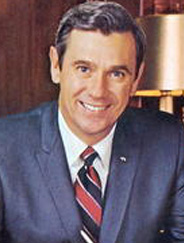 A Democrat who had represented the Pensacola and North Escambia area in the Legislature, Askew defeated incumbent Republican Gov. Claude Kirk in 1970 and was re-elected in 1974, becoming the first governor in Florida history to be elected to successive four-year terms.
A Democrat who had represented the Pensacola and North Escambia area in the Legislature, Askew defeated incumbent Republican Gov. Claude Kirk in 1970 and was re-elected in 1974, becoming the first governor in Florida history to be elected to successive four-year terms.
Askew is considered by historians to be one of the most influential politicians in Florida’s modern history, second only to the late Gov. LeRoy Collins, who oversaw the state during the turbulent civil-rights era.
A teetotaler who was prim and could even be prudish, Askew, a lawyer, was relatively unknown when he ran for governor. Bucking the business community, Askew made a corporate income tax an integral part of his 1970 campaign.
Florida was in the midst of a population and development boom when Askew took over as chief executive. The state was still grappling with racial tensions prompted by the U.S. Supreme Court decision that put an end to school segregation. The devoutly religious Askew, born in Muskogee, Okla., was on the opposite side of many other Southern politicians, as well as many of his Pensacola constituents, in his call for racial reconciliation.
In response to an anti-school busing “straw poll” proposed by conservative Democrats and Republicans, Askew countered with a proposal asking voters if they wanted to keep schools integrated. Voters approved both non-binding measures.
Although the anti-busing measure passed overwhelmingly, Askew’s opposition to it endeared him to voters, said Sandy D’Alemberte, who was a close friend of Askew and served alongside him in the Legislature.
“He took the right position. He was on the right side of history. He was courageous. And the public, even though they disagreed with him on busing, recognized that he was a person of integrity, and his popularity increased,” D’Alemberte, a former president of the American Bar Association, said Thursday.
Askew appointed the state’s first black Cabinet member since Reconstruction, and pardoned, with the Cabinet, Freddie Pitts and Wilbert Lee, two black men who spent 12 years on Death Row after being wrongly convicted by an all-white jury. Askew also integrated the Florida Highway Patrol.
Askew served as governor during a scandal-ridden era when Watergate rocked Washington and, in Florida, two state Supreme Court justices were forced out of office and three Cabinet members were indicted. Askew thwarted the Legislature by spearheading the first petition initiative, known as the “Sunshine Amendment,” approved by voters in 1978. The constitutional amendment opened government records and required public officials to disclose information about their financial affairs. Florida’s “government in the sunshine” standards, considered by many to be Askew’s chief legacy, are still viewed as a model for the nation.
Askew also “left a permanent and meaningful imprint” on Florida regarding environmental issues, said Jay Landers, who served as a cabinet aide to Askew before the governor appointed him to head up the state’s first environmental agency. Askew pushed through legislation, still on the books, that created the state’s water management districts, required local comprehensive plans, regulated wetlands and set air-quality standards.
Askew’s “litany of legislative triumphs” are “still significant 40 years later,” Landers said. “To me, we don’t elect people like that anymore. And I don’t think we ever will. And it’s a real shame.”
The straight-laced Askew never drank, did not swear and was a devout Presbyterian — a sharp contrast to many of his colleagues in the Capitol. Askew did not allow alcohol at governor’s mansion dinners or social events. Because of that, mansion events were often followed by after-parties sponsored by lobbyists.
Landers regularly played tennis with Askew at a court across the street from the mansion on Sunday afternoons when downtown Tallahassee was deserted and there was not a car on the road within miles.
“He would not cross the street to go to the tennis court until the light changed,” Landers recalled.
In a 1998 interview with Florida State University’s “Research in Review,” Askew said he wanted to restore “some sense of responsibility and competence” in the governor’s office.
“It sounds awfully corny for me to say this but my goal wasn’t (simply) to get elected governor,” Askew said during the interview. “My goal was to get elected in such a way as I could govern. There’s a big difference. … So many people who run for office negotiate away all their options in the pursuit of the office and they literally tie their hands on dealing with the problems, by commitments.”
Askew, an attorney, said the Sunshine Amendment, fiercely opposed by many legislators at the time, stopped “a lot of circuitous business transactions in state and local government.”
“Having to report your income is sort of an invasion of privacy and yet, I felt, while it was extraordinary, I felt that it was needed to give some sense of reassurance to the people (about their elected officials),” he said during the 1998 interview. “Who are they working for? Are they working for themselves or for the people?”
Askew “always put principles before politics,” said former Gov. Jeb Bush, one of many Republican officials who lavished praise on the late governor in statements released Thursday.
“Florida has lost one of the great leaders who played a pivotal role in shaping the trajectory of our state during a time of substantial growth and change. He led on contentious issues, fought for equality and did what he believed was in the best interests of Florida families. Governor Askew always put principle before politics, and I was fortunate to know him, seek counsel from him and learn from his years of service,” Bush said in a statement.
After leaving office, Askew served as the U.S. trade representative from 1979 to 1981. He ran unsuccessfully for president in 1984. He later taught at the Askew School of Public Administration and Policy at Florida State University, where he received a bachelor’s degree in 1951.
The former governor is survived by his wife of 57 years, Donna Lou; a son, Kevin Askew; a daughter, Angela White; and several grandchildren. Askew will lie in state at the Historic Capitol Museum on Tuesday from 10 a.m. to 6 p.m. Funeral services are scheduled for 2 p.m. Wednesday at Faith Presbyterian Church, 2200 North Meridian Road, Tallahassee.
Northview, Jay Compete In Track Meet (With Photo Gallery)
March 14, 2014
The Northview Chiefs and Jay Royals competed in a track meet Thursday at Jay High School against Baker, Central, Holmes County and J.U. Blacksher of Uriah, AL.
Team results were as follows:
Boys:
- Baker
- Jay
- Northview
- J.U. Blacksher
- Central
- Holmes County
Girls:
- Baker
- Jay
- Central
- J.U. Blacksher
- Northview
- Holmes County
For a photo gallery, click here.
NorthEscambia.com photos, click to enlarge.
Greg Evers: “It’ll Be Snowing In Miami” When Pension Bill Passes
March 14, 2014
A law-enforcement union and one of the Republican senators who helped kill an overhaul of the state pension system last year came out Thursday against this year’s version of the revamp, appearing to further dim hopes for a compromise bill to pass.
“When it passes, it’ll be snowing in Miami,” Sen. Greg Evers, R-Baker, said. Evers’ district includes Escambia and Santa Rosa counties.
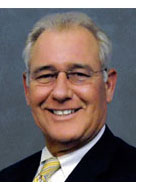 Evers was one of a handful of renegade GOP senators who sank a more-sweeping pension overhaul last year. Supporters had hoped that carving out law-enforcement and emergency workers in this year’s legislation would make it easier for lawmakers like Evers to support.
Evers was one of a handful of renegade GOP senators who sank a more-sweeping pension overhaul last year. Supporters had hoped that carving out law-enforcement and emergency workers in this year’s legislation would make it easier for lawmakers like Evers to support.
But so far, the effort appears to have stalled. The Senate proposal (SB 1114) cleared the Community Affairs Committee by one vote last month after Sen. Jack Latvala of Clearwater, another one of the Republicans who voted against last year’s overhaul, opposed it.
Baker spoke at a press event with the Fraternal Order of Police, a law-enforcement union that is opposed to this year’s measure. James Preston, the president of the organization’s Florida State Lodge, said even exempting “special risk” workers didn’t make the proposal any more palatable to the organization.
He said those employees make up a small slice of people paying into the Florida Retirement System.
“If we’re carved out and all those other members are no longer putting into the system, eventually, that system is going to collapse, it’s going to destabilize because no fresh money’s coming in,” Preston said. “And it will eventually affect us. We know if we’re carved out this year, they’re coming back after us a year from now or two years from now.”
The pension-reform bill is one of the top priorities of House Speaker Will Weatherford, R-Wesley Chapel, and Senate President Don Gaetz, R-Niceville. Weatherford pushed a bill last year that would have moved all future retirees into a 401(k)-style investment plan, instead of the state’s traditional pension plan.
This year’s Senate proposal would still close the Florida Retirement System’s traditional pension plan to new employees after July 1, 2015, though those employees already in the system would remain. New hires would be required to choose between the investment plan and a “cash balance” plan, which in some ways would act like a 401(k) but would guarantee a minimum benefit.
Sen. Wilton Simpson, a Trilby Republican who has sponsored SB 1114, told a reporter as he left an unrelated committee meeting that he didn’t want to comment about the pension bill. When told that the Fraternal Order of Police had announced its opposition to the measure, Simpson said: “Now, there’s a shocker.”
Evers indicated his support could be won for the bill — if the Legislature agrees to a condition that even he said was incredibly unlikely.
“You give state employees, whether they’re wearing a uniform and carrying a gun or whether they’re sitting behind a desk, you give every employee a 50 percent pay raise, and then I think that we could take and redo the FRS,” he said.
By Brandon Larrabee, The News Service of Florida
Sunny Friday, Rain Moving In For The Weekend
March 14, 2014
Here is your official North Escambia area forecast:
- Tonight Clear, with a low around 36. West wind around 5 mph becoming calm in the evening.
- Friday Sunny, with a high near 68. Light east wind becoming south 5 to 10 mph in the morning.
- Friday Night Increasing clouds, with a low around 47. South wind 5 to 10 mph becoming light southeast in the evening.
- Saturday A 30 percent chance of showers after 7am. Cloudy, with a high near 70. Light southeast wind increasing to 5 to 10 mph in the morning.
- Saturday Night A chance of showers, then showers and thunderstorms likely after 7pm. Cloudy, with a low around 60. Southeast wind around 10 mph. Chance of precipitation is 70%.
- Sunday Showers and thunderstorms likely before 7am, then showers likely and possibly a thunderstorm after 7am. Cloudy, with a high near 73. Southeast wind 10 to 15 mph, with gusts as high as 20 mph. Chance of precipitation is 70%.
- Sunday Night Showers likely and possibly a thunderstorm before 7pm, then a slight chance of showers. Mostly cloudy, with a low around 48. Southwest wind 5 to 10 mph becoming north after midnight. Chance of precipitation is 60%.
- Monday A 20 percent chance of showers. Sunny, with a high near 67. North wind 5 to 15 mph becoming south in the afternoon. Winds could gust as high as 25 mph.
- Monday Night Mostly clear, with a low around 41. Breezy, with a northwest wind 15 to 20 mph decreasing to 5 to 10 mph after midnight. Winds could gust as high as 30 mph.
- Tuesday Sunny, with a high near 71.
- Tuesday Night Mostly clear, with a low around 47.
- Wednesday Mostly sunny, with a high near 74.
- Wednesday Night Partly cloudy, with a low around 48.
- Thursday Mostly sunny, with a high near 74.
Deputies Looking For Man For Questioning In Nightclub Shooting
March 14, 2014
The Escambia County Sheriff’s Office is looking for a person for questioning in reference to an early Thursday morning shooting at Ray’s Soul City on Baar’s Street.
Deputies responded to the establishment for a shots fired disturbance just before 1 a.m. They found a female victim with a minor graze from a bullet. She was transported to an area hospital with non-life threatening injuries.
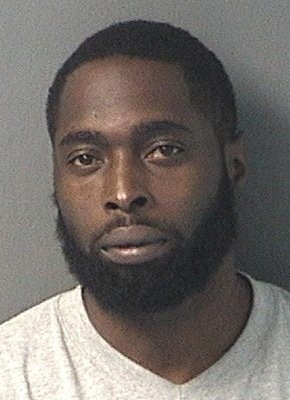 Deputies said they are looking for 30-year old George Newman Barge for questioning in connection with the shooting.
Deputies said they are looking for 30-year old George Newman Barge for questioning in connection with the shooting.
Anyone having information on this crime or the whereabouts of Barge is urged to contact Crimestoppers at (850) 433-STOP or the Escambia County Sheriff’s Office at (850) 436-9620.
Escambia Woman Gets 25 Years For Two Armed Robberies
March 14, 2014
An Escambia County woman was sentenced to prison Thursday for her part in two armed robberies.
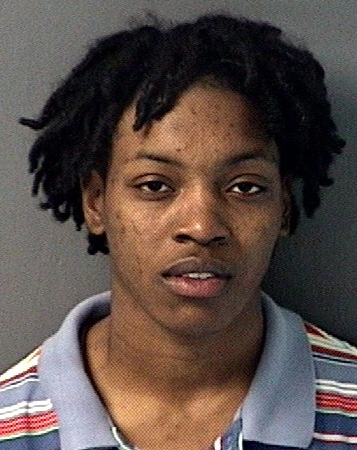 Keashtani Renee Sapp was sentenced by Judge Edward P. Nickinson III to 25 years state prison with 10 years as a mandatory minimum sentence under the 10-20-Life law. Sapp pled no contest on March 6, 2014 for her involvement in two separate armed robberies.
Keashtani Renee Sapp was sentenced by Judge Edward P. Nickinson III to 25 years state prison with 10 years as a mandatory minimum sentence under the 10-20-Life law. Sapp pled no contest on March 6, 2014 for her involvement in two separate armed robberies.
On October 2, 2012, Sapp was given a ride home by Danicia Copeland to Oakwood Terrace Apartments. Upon arrival, Sapp struck Copeland in the face numerous times while demanding money from her. Sapp was observed to have had a handgun in her pocket during the robbery and was able to get away with approximately $800.
On January 16, 2013, Sapp was given a ride home from George Stone Technical Center by Timothy Norris. Sapp asked Norris to pick up two unidentified males prior to arriving at 215 Cross Street. Upon arrival, the two unidentified males each stuck a handgun to the back of his head, demanding money. Sapp went through Norris’ pockets and robbed him of $300 cash and other personal items. Sapp was identified by the victim in both of these cases.
Sapp was released from prison on July 5, 2012, after serving 18 months for other charges.







